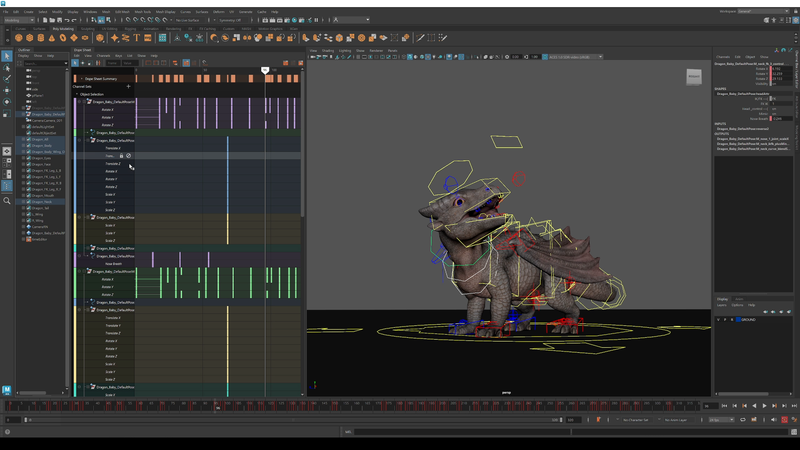
To help promote collaboration and creativity, Autodesk has put connected workflows and time-saving new toolsets at the forefront of the latest development of its Design & Make software.
Autodesk product management and content creation director Ben Fischler said that these latest updates will enable its users to collaborate better and work smarter by supporting open standards, strengthening our content creation tools, and unifying workflows and data across entire production pipelines.
Improve collaboration with open standards
With co-development on the rise, connecting assets and data across different tools, departments, and studios is crucial. This latest release introduces OpenColorIO support in 3ds Max, LookdevX enhancements in Maya, and a more robust OpenUSD (Open Universal Scene Description) integration in both tools for improved collaboration.
— OpenColorIO support in 3ds Max – Easily adopt a standardised colour management framework with OpenColorIO, now the default colour management mode for new scenes in 3ds Max. Key enhancements include full-colour management integration for the VertexPaint tool and the ability to designate colour space for output files in the Bake to Texture tool.
— LookdevX enhancements in Maya – Achieve seamless material portability with significant enhancements to LookdevX, Autodesk’s agnostic material authoring plugin supporting OpenUSD. New workflows include the ability to work within an active Maya session using either native USD or MaterialX shading graphs, or both, as well as new data structures for more robust file I/O workflows.
— OpenUSD improvements – For interoperable and nondestructive asset creation, 3ds Max USD 0.7.0 now enables importing animations such as animated lights, cameras, and BlendShapes. Maya USD 0.27 brings the ability to load or unload multiple prims simultaneously and use the Universal Manipulator for prim manipulation.
— Hydra enhancements in Maya – Get one step closer to seamless viewport renderer integrations with significant enhancements to the Hydra viewer (technology preview). You can also now engage in the plugin’s development on GitHub.
Work smarter with new productivity tools
Modellers and animators can achieve new levels of productivity in Maya with a new Smart Extrude tool, Motion Trail Editor, and a completely redesigned Dope Sheet. In 3ds Max, artists can achieve professional results even faster with improvements to tools like Retopology.
— Smart Extrude in Maya – Extrude faces on a mesh in a predictable and flexible way with a new Smart Extrude tool (already available in 3ds Max) and eliminate the need to handle messy, unwanted geometry.
— Retopology enhancements in 3ds Max – Minimise friction when modeling with significant speed improvements when optimising asset geometry with Retopology 1.5.
— Redesigned Dope Sheet in Maya – Enjoy a user-friendly animation experience with a completely redesigned Dope Sheet, including the ability to create and flip between sets of commonly used animation controls for your characters.
— Motion Trail Editor in Maya – Reduce mouse travel and clicks with access to everything motion trail-related in a new, single spot, the Motion Trail Editor
— Global Search in 3ds Max – Save time hunting through menus with Global Search, which displays a thorough list of tools, functions, commands and settings when you press “x” in the viewport.
–GPU Renderer Overhaul in Arnold – Render in a flash with an overhauled GPU Renderer in Arnold, bringing multiple improvements in startup time and rendering speed.
Automate content creation with proceduralism
New procedural tools in Bifrost for Maya help automate mundane tasks so that valuable resources and talent can be dedicated to bringing better-looking visuals to the screen.
— Bifrost Ocean Simulation System (BOSS) – Reduce mouse clicks with procedural ocean simulation with BOSS, now integrated into the Bifrost graph, supporting 2D foam simulations and geometry displacement for waves.
— Liquid meshing – Streamline content creation with in-graph liquid meshing tools in the Bifrost graph. This modular compound is designed to work with imported.bif caches from Bifrost liquids in Maya.
Autodesk Flow: Raising the game with a new name
Autodesk Flow is the industry cloud for media and entertainment built on Autodesk’s Design & Make platform. It will connect people, workflows, and data across the entire production lifecycle, from earliest concept to final delivery. Effective today, the Autodesk product formerly known as “ShotGrid” will be renamed, “Flow Production Tracking,” and “Moxion” will now be called “Flow Capture.”
For the moment, those who know and love ShotGrid and Moxion will continue to enjoy the full range of capabilities they’ve come to expect — with a few new features to look forward to that streamline workflows and better connect creative teams from on-set through final delivery:
— Flow Capture customers will now experience a new, more intuitive UI that further accelerates creative workflows as well as a new integration with Avid Media Composer soon that allows editors and post-production teams to get to work the moment shooting wraps.
— As announced at Autodesk University 2023, Flow Production Tracking customers will soon experience new AI-powered scheduling capabilities, so studios can confidently deliver projects on time and budget. Customers will get to experience new AI-powered scheduling capabilities, so studios can confidently deliver projects on time and budget.
Together, Flow Production Tracking and Flow Capture break down barriers between on-set and post-production workflows so teams and studios can collaborate more efficiently; Autodesk’s recent acquisition of PIX will also accelerate this effort.
